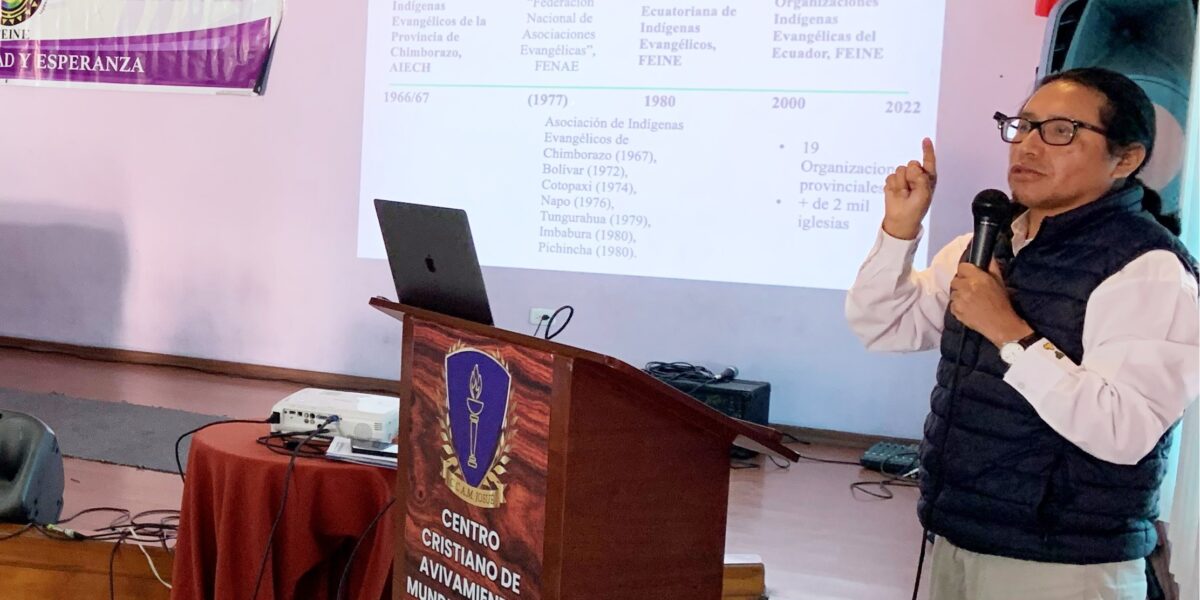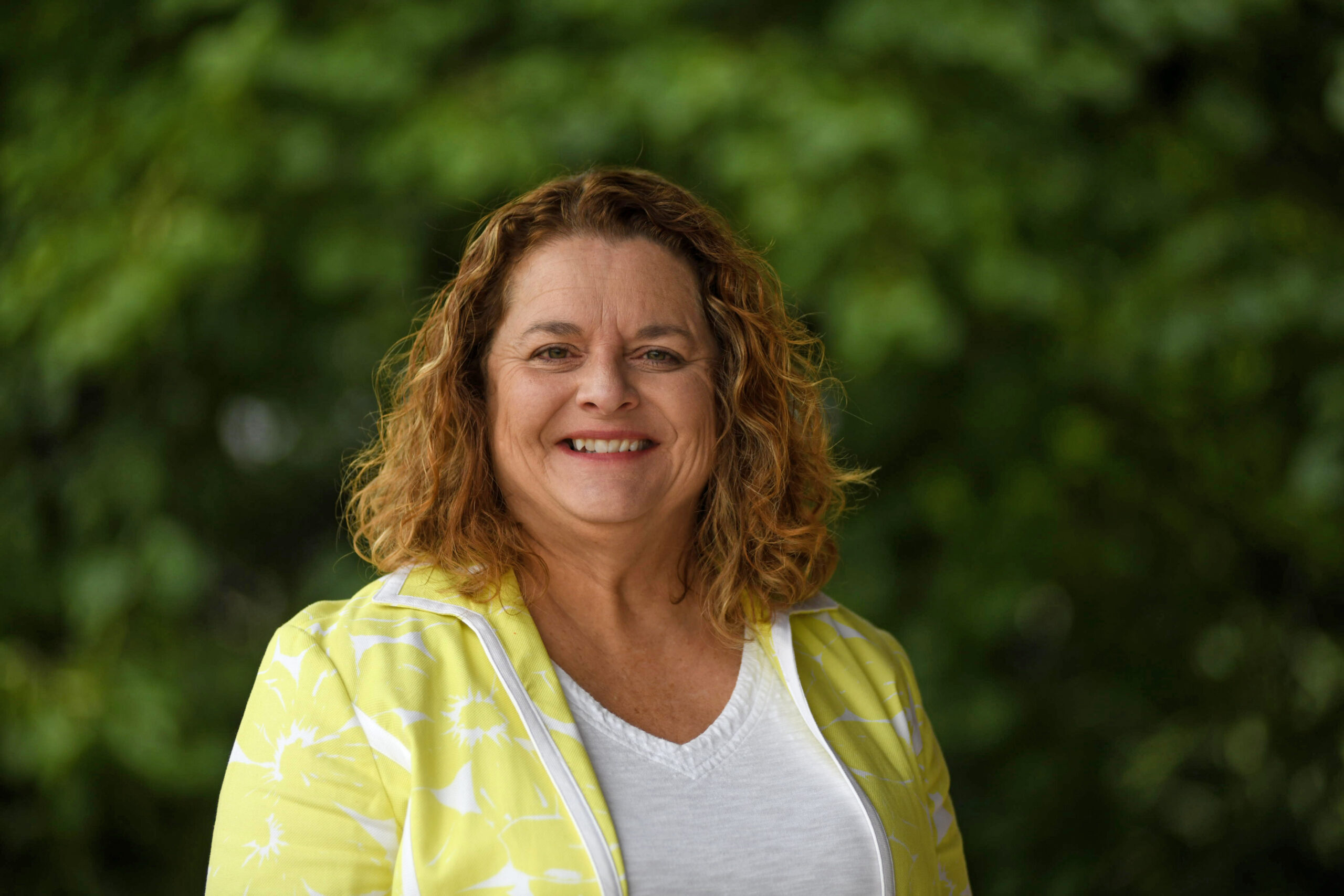Versión en español
For nearly four decades, injustice in Ecuador, especially for Indigenous Peoples, has led to an increasing number of protests, national uprisings and strikes. Yet racism against and the marginalization of Indigenous groups has increased. The pandemic further crippled economies in the region and led to an immigration crisis, exasperated by Venezuela’s economic and political woes, which led to an increase in the number of people seeking better opportunities in Ecuador.
As a result of these and recent events, Mission Network partner
Council of Indigenous Evangelical Nations and Organizations of Ecuador (FEINE) and leaders in Ecuadorian Mennonite churches expressed the need to be able to develop effective mediation and conflict transformation processes, to offer sustainable and durable solutions to conflicts, and to train and support regional leaders in methods of nonviolent direct action.
Mennonites have accompanied the Indigenous Peoples of Ecuador since 1990, primarily in the areas of theological training and formation. This relationship began with Mennonite Board of Missions, and later passed to Mission Network through a partnership that includes
Iglesia Cristiana Menonita de Colombia (IMCOL) and
Central Plains Mennonite Conference (CPMC).
At the request of FEINE President Eustaquio Tuala, Mission Network’s Ecuador Partnership Co-coordinator
Peter Wigginton, and Training and Resource Specialist — Church Planting
Mauricio Chenlo held workshops for FEINE leaders December 8-10, 2022, in FEINE’s national office in Quito, Ecuador. Chenlo has maintained relationships with Indigenous church leaders since he worked in Ecuador with a predecessor agency in the ‘90s.
FEINE invited leaders from 22 local provincial chapters to attend the workshops, which focused on faith and politics, as well as mediation and reconciliation.
Julián Guamán, general secretary of
Iglesia Cristiana Menonita de Ecuador (ICME, Ecuador Mennonite Christian Church)*, opened the workshop by sharing the history of FEINE and its involvement with the numerous Indigenous uprisings and strikes during the past 35 years in Ecuador. He closed with the details of the most recent strike in June 2022 (see
Mennonite Mission Network partners seek mediation between protestors, government), which left eight dead and severely impacted the country’s oil industry.
Ecuador President Guillermo Lasso agreed to a 90-day dialogue between government ministers and Indigenous groups, including FEINE, to negotiate an agreement. This ended more than two weeks of Indigenous protests against his economic and environmental agenda. In November 2022, advances were made in labor rights, price control policies, education and fuel subsidies, yet agreements on several of the Indigenous groups’ demands are still pending.
Chenlo observed that since the ‘90s, FEINE leaders had gone through many phases of growth, maturity and struggles.
“They all share an evangelical core in their witness, with a strong political and social presence in Ecuador,” said Chenlo.
The first day of the workshop, Chenlo discussed a biblical history of faith and politics. He was followed by
Ricardo Esquivia Ballestas, a lay leader working within the
Mennonite Church of Colombia and the Colombian Council of Evangelical Churches, who shared about his life-long reconciliation work within Colombia communities — first through
Justapaz and, then, through the organization he founded,
Sembrando Paz.
Nancy Pilatuña, FEINE governing board member, said she was “very thankful for the opportunity to learn new ideas and ways to empower my community.”

Mauricio Chenlo leades in-depth study of the Beatitudes in Matthew 5 with a focus on the “Political Platform of Jesus.” Photo by Peter Wigginton.
On the second day, there was an in-depth Bible study of the Beatitudes in Matthew 5, with a focus on the “Political Platform of Jesus.” Many pastors in Ecuador have become political leaders and are in government roles.
“The pastors want to learn more about the Anabaptist ‘Third Way,’ in which we stress the witness of Jesus through servant leadership and non-violent action. It seems like this is a time of opportunity for Mission Network to walk with those who want to go deeper on this path and use their power to serve the poor and marginalized,” Chenlo said.
The workshops were the first in a series of workshops that will investigate how Mission Network can continue to support FEINE and their local chapters in areas of faith in politics and reconciliation, peace work, and non-violent action.
Wigginton said, “FEINE requested Mission Network deliver the workshop in two additional provinces and open it to other Indigenous organizations. We are starting with a session of the Pacificadores this month.”

Closing prayer is given during closing of workshops on faith and politics and reconciliation and justice.
Pacificadores is an online course that details principles and practices needed to build communities of peace.
This reconciliation and justice effort in Ecuador has been envisioned and developed by the three Ecuadorian Mennonite conferences, with support from Mission Network and funds from the Schowalter Foundation.
Tuala offered “infinite thanks for blessing us and 50 church leaders with these workshops which will strengthen organizational and political processes in our grassroots organizations.”
* ICME is a multicultural conference, comprised primarily of Indigenous Peoples and formed by uniting independent churches with theological and relational affinity. The church leaders have received Anabaptist theological education, through Ecuador ministries.
Related
More information about Mission Network and partners in Ecuador
Mission Network’s partnership with ICME
Eustaquio Tuala‘s interview in Merienda Menonita
Indigenous organizations and government conclude negotiations in Ecuador
Ecuador’s government, indigenous groups reach agreements following talks
La Red de Misión organiza talleres sobre fe, política y reconciliación en Ecuador
el Consejo de Pueblos y Organizaciones Indígenas Evangélicos del Ecuador (FEINE), coparticipante de la Red de Misión, y los líderes de las iglesias menonitas ecuatorianas, manifestaron la necesidad de desarrollar procesos efectivos de mediación y transformación de conflictos, ofrecer soluciones sostenibles y duraderas a los conflictos, y apoyar y capacitar a los líderes locales en métodos de intervención directa no violenta.
la Iglesia Cristiana Menonita de Colombia (IMCOL) y la
Conferencia Menonita Central Plains (CPMC).
Peter Wigginton, y el especialista en Capacitación y Recursos–Plantación de iglesias,
Mauricio Chenlo, organizaron talleres para los líderes de la FEINE del 8 al 10 de diciembre del 2022 en la oficina nacional de la FEINE en Quito, Ecuador. Chenlo ha mantenido la relación con los líderes de iglesias indígenas desde que trabajó en Ecuador con una agencia predecesora en la década del 90.
Iglesia Cristiana Menonita de Ecuador (ICME)*, dio inicio al taller con un raconto de la historia de la FEINE y su involucramiento en los innumerables levantamientos y huelgas indígenas durante los últimos 35 años en Ecuador. Y cerró el taller con los detalles del paro más reciente de junio del 2022 (ver
Mennonite Mission Network partners seek mediation between protestors, government), que dejó como saldo ocho muertos y la industria nacional de petróleo fuertemente debilitada.
“Todos comparten una base evangélica en su testimonio, con una fuerte presencia política y social en Ecuador,” dijo Chenlo.
Ricardo Esquivia Ballestas, un líder laico de la
Iglesia Menonita de Colombia y el Concilio de iglesias evangélicas de Colombia, quien compartió su trabajo de toda la vida de reconciliación dentro de las comunidades de Colombia, primero con
Justapaz y luego con la organización que él mismo fundó,
Sembrando Paz.
Nancy Pilatuña, miembro del consejo de la FEINE, dijo que estaba “muy agradecida por la oportunidad de conocer ideas nuevas y aprender otras maneras de empoderar a mi comunidad.”
“Los pastores quieren aprender más acerca del “Tercer camino” del anabautismo, en el cual enfatizamos ser testigos de Jesús mediante el liderazgo como siervos y la acción no violenta. Parece que éste es el momento oportuno para que la Red de Misión camine junto a quienes buscan ahondar en este camino y usar su poder para servir a los pobres y marginados,” dijo Chenlo.
Wigginton dijo: “La FEINE solicitó que la Red de Misión dé el taller en dos provincias más y se abra a otras organizaciones indígenas. Este mes comenzamos una sesión de la serie Pacificadores.”
Tuala ofreció su “profundo agradecimiento por bendecirnos a nosotros y a 50 líderes de iglesias con estos talleres que fortalecerán los procesos organizativos y políticos de nuestras organizaciones de base.”
Artículos relacionados (solo en inglés)
More information about Mission Network and partners in Ecuador








